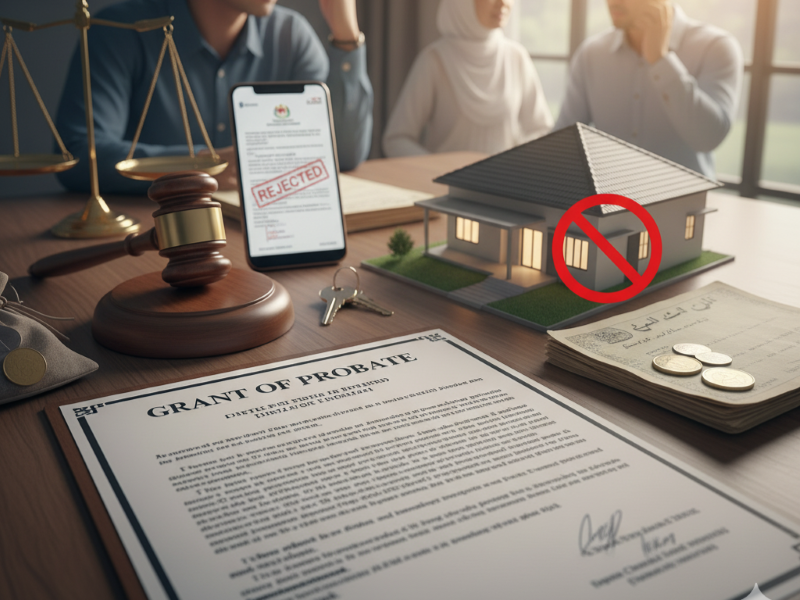🏠 Uncle Lim’s story: Can a letter be considered a will?
Uncle Lim, in his seventies, lost his wife years ago and had two sons and one daughter.
His most valued possession was a two-storey ancestral house in Penang .
He often told friends, “This house isn’t worth much, but it holds memories. Lim Min visits me the most and understands me best, so I want to leave it to her.”
One day, Uncle Lim handwrote a letter 📜:
“I, Lim Kim Chuan, being of sound mind, voluntarily give my house in Penang entirely to my youngest daughter, Lim Min, and the rest of my movable assets, including bank savings, shall be equally divided among my three children.”
(It was dated and signed by Uncle Lim ✅)
However, Uncle Lim did not get any witnesses to sign, nor did he inform anyone or consult a lawyer; he simply kept the envelope in his wardrobe.
⚖️ Legal validity: Does a signature mean a valid will?
In 2025, Uncle Lim passed away peacefully.
While sorting through his belongings, Lim Min found the letter and tearfully told her brothers, “Dad left the house to me.”
Her eldest brother, Lim Wei, immediately objected, “That’s just a letter—without a lawyer and two witnesses, how can it be a will?”
Her second brother, Lim Cheng, said, “Under Malaysia’s Distribution Act 1958, without a valid will, we all have a share—it can’t go to you alone!”
This led the three siblings to face each other in court。
👩⚖️ What did the lawyer say?
In court, the lawyer explained that in Malaysia, you can write your own will, but it must comply with the requirements of the Wills Act 1959, without missing any :
✅ The testator must be at least 18 years old
✅ The testator must be of sound mind and act voluntarily
✅ The will must be in writing (in any language)
✅ It must be signed in the presence of two witnesses aged 18 or above
✅ Witnesses cannot be beneficiaries or the testator’s spouse
✅ The will must name at least one executor and one substitute executor
Although Uncle Lim’s letter was genuine and signed, it lacked witness signatures, making it invalid under the law .
📌 What happens if a will is invalid?
Although the letter morally favoured Lim Min, it had no legal effect.
As a result, the house and other assets had to be distributed under Section 6 of the Distribution Act 1958, equally among the spouse (if alive) and children.
Lim Min was ultimately unable to inherit the house alone, and her father’s good intentions could not be fulfilled 💔.
📝 Writing your own will – don’t overlook these!
Uncle Lim’s story reminds us: Writing your own will in Malaysia is legal, but you must follow the procedure.
💡 Remember these 5 key points:
1️⃣ Be at least 18, of sound mind, and sign personally
2️⃣ Have 2 legal witnesses (aged 18+, not beneficiaries)
3️⃣ Witnesses must sign in the presence of the testator
4️⃣ State at least 1 executor and 1 substitute executor
5️⃣ Keep the original will safely, preferably with a lawyer
🚫 If the will is invalid, how is the estate distributed?
If a will is declared invalid by the court, the estate will be distributed under Section 6 of the Distribution Act 1958, usually shared among the spouse, parents, or children according to legal proportions ⚖️.
This may go against the testator’s original wishes and even cause family disputes.
✅ Lawyer’s tip
✔️ Writing your own will can save costs, but the process is complex and leaves little room for error.
✔️ To ensure your will is valid, have a professional lawyer draft and witness it for a one-time, worry-free solution.
✔️ If updating or revoking your will, follow the law to make a new one and destroy the old copy to avoid conflicts.
💡 Conclusion
A will isn’t for yourself, but for your loved ones—a clear, reassuring, and dignified arrangement.
Don’t let a simple letter ruin good intention—let professional legal advice safeguard your wishes.
📞 Want a valid, complete, and worry-free will? Contact us 👨⚖️👩⚖️!












